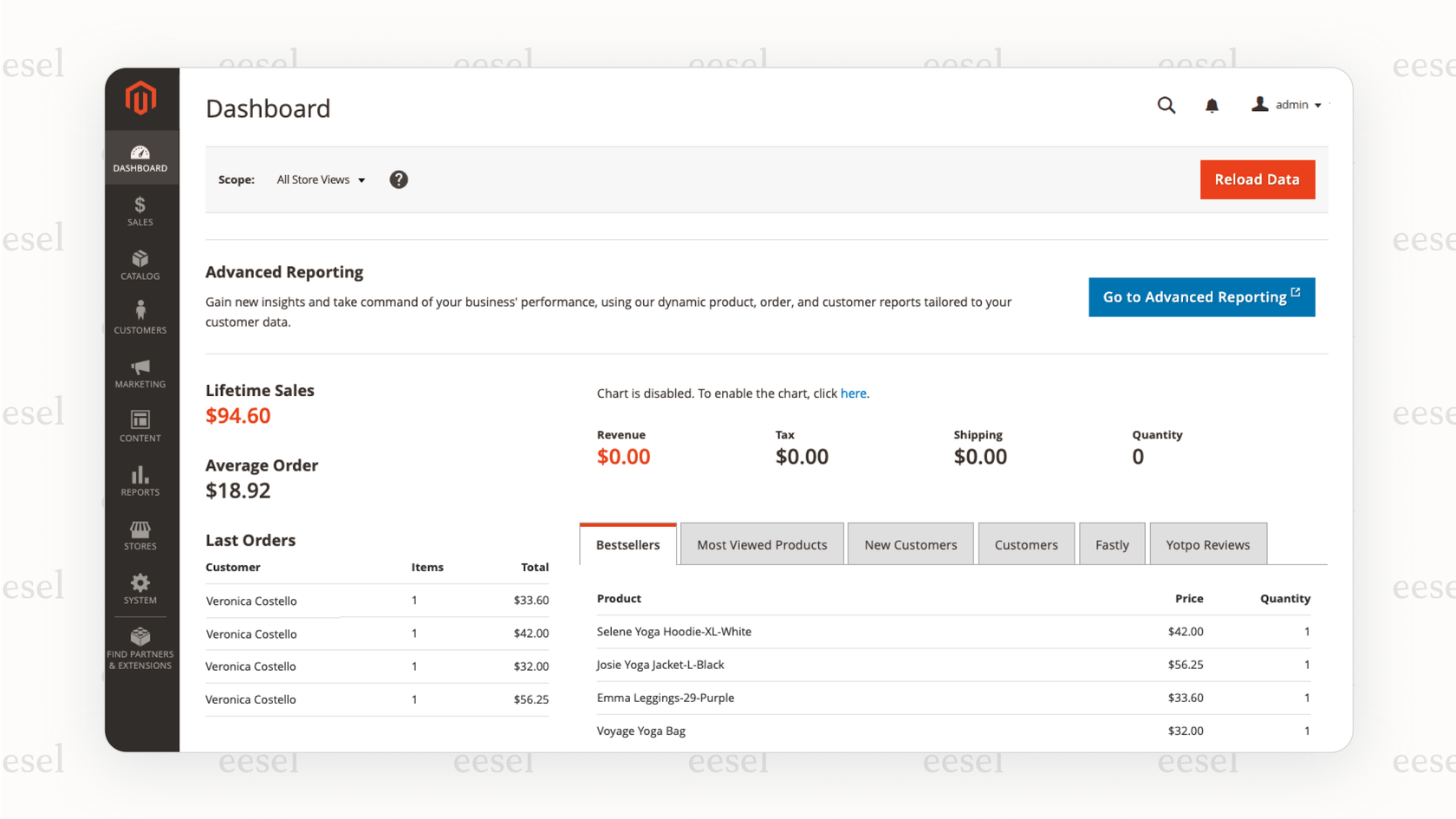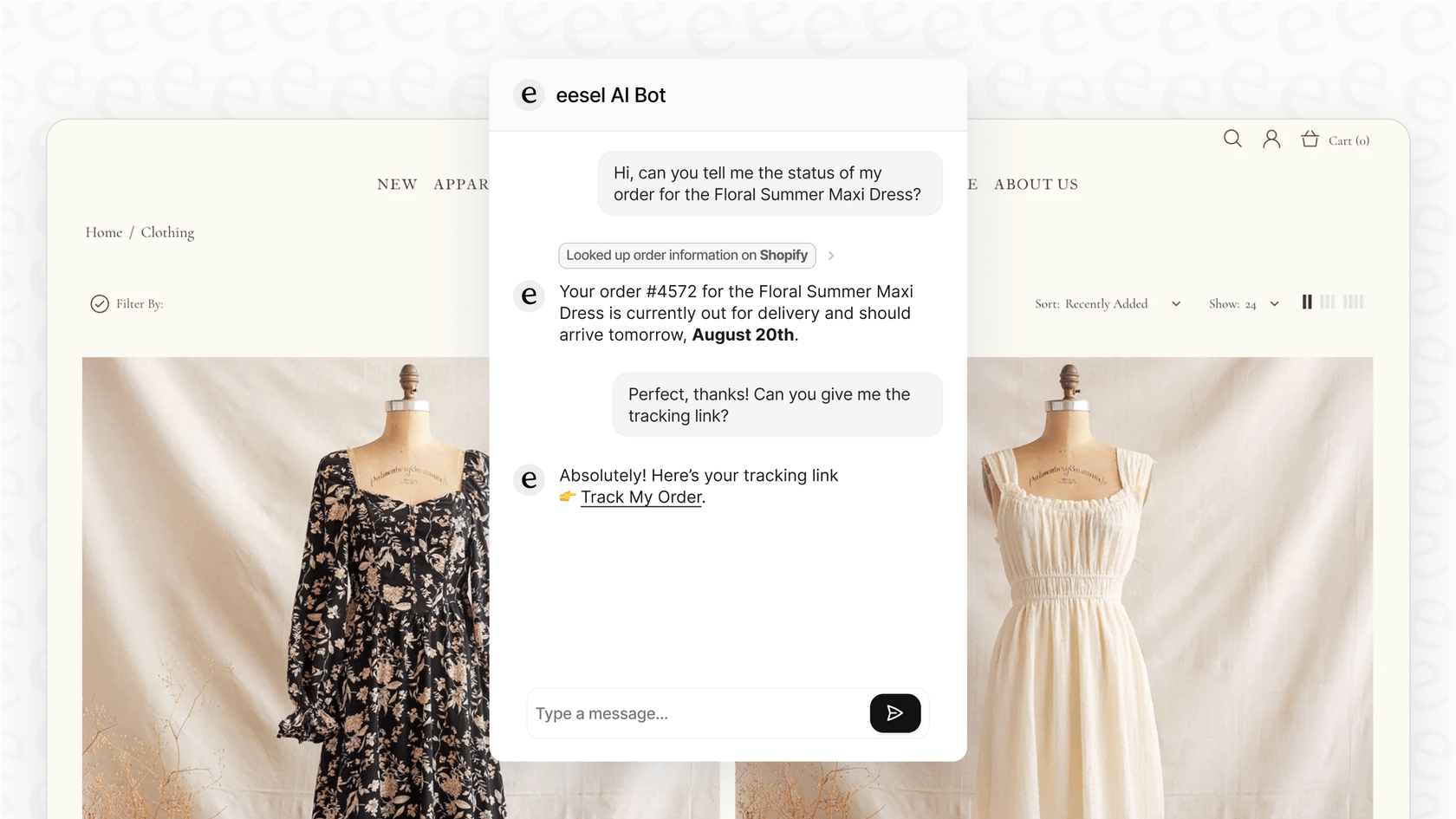
Running an an online store often feels like you're trying to do a million things at once. Getting new customers in the door is a big one, but it's also expensive. One of the best ways to grow your revenue is to increase your Average Order Value (AOV) by encouraging the customers you already have to spend a little more.
For anyone on Magento, this usually means hours spent manually setting up product recommendations or relying on clunky, rule-based extensions. But what if you could hand that work over to AI?
This guide will walk you through how Magento AI can completely change how you suggest product upsells and cross-sells. We'll go from the tedious old ways to a smarter, automated approach that actually gets what your customers are looking for.
Understanding upsells and cross-sells
Before we get into the tech, let's make sure we're on the same page. People often use "upsell" and "cross-sell" interchangeably, but they're two different moves designed to increase a customer's total purchase value.
-
Upselling: This is all about convincing a customer to buy a slightly better, more expensive version of the item they're looking at. Think about when you're buying a laptop, and the site shows you a model with a faster chip and more memory for a bit more money. That's an upsell. The idea is to swap their choice for a higher-margin one.
-
Cross-selling: This is about recommending products that go well with what's already in the customer's cart. If someone buys a new smartphone, suggesting a phone case and a screen protector is a classic cross-sell. The goal here is to add more items to the cart.
In Magento, you usually see these suggestions on the product page or in the shopping cart. When they're done well, they feel like helpful tips, not a pushy sales pitch. It’s a win-win: the customer gets a better solution, and you increase your revenue.

The old way: Manual product recommendations
For a long time, Magento store owners had two main options for handling product recommendations. Both have some pretty big downsides, especially as your business and product catalog get bigger.
The pain of manual assignments
Out of the box, Magento lets you manually link related products, upsells, and cross-sells for every single item you sell. This means clicking into a product, finding the "Related Products, Up-Sells, and Cross-Sells" tab, and then searching for and adding items one by one.
Sure, it gives you total control, but it's an absolute time sink and just doesn't work at scale. If you have thousands of products, this could take one person weeks to set up. And maintaining it? Forget about it. As soon as products go out of stock or you add new ones, your hard work is out of date.

The limits of rule-based extensions
To get around all that manual labor, many stores use extensions that automate recommendations based on a list of rules you create. These rules are usually pretty simple, like:
-
"If an item is in Category X, recommend other items from Category X."
-
"If a product is made by Brand Y, suggest other things from Brand Y."
-
"Show items that are often bought together."
This is definitely better than doing it all by hand, but it's still pretty basic. The system can’t understand the actual context or relationship between products. A rule might suggest another t-shirt to someone buying a t-shirt, but it has no idea that a person buying hiking boots might also need wool socks or a waterproof jacket, even if those items are in different categories and from different brands. You end up having to constantly adjust the rules, and they can easily end up showing irrelevant or out-of-stock products if you're not careful.
How Magento AI automates recommendations
A true AI-powered system is a whole different ballgame. It goes way beyond simple rules. Instead of just matching attributes like brand or category, modern AI uses things like semantic search to understand the meaning behind your products.
How Magento AI understands products
At its heart, a Magento AI that suggests product upsells and cross-sells works by reading all your product info (titles, descriptions, etc.) and turning it into a rich, numerical format. This lets the AI grasp relationships based on meaning, not just matching keywords.
For example, the AI can figure out that "trail running shoes" and a "hydration pack" are related because it understands the activity they're used for. It gets the intent of the person looking at those products, even if you never wrote a rule connecting them. It's the same kind of smarts that lets Google understand what you're really asking for, even if your search query is a bit messy.

Benefits of an AI-powered approach
This smarter way of doing things brings some real advantages that rule-based systems just can't offer:
-
Genuinely relevant suggestions: Recommendations are based on what the user is actually trying to do, which leads to more clicks and higher conversion rates.
-
Handles large catalogs easily: The AI automatically processes your entire catalog, saving you hundreds of hours of manual setup.
-
It learns and adapts: As you add new products and customer behavior changes, the system adapts on its own. No need to go in and write a bunch of new rules.
-
Finds hidden gems: AI can spot connections between products that you and your team might never have thought of, just by analyzing sales data and product descriptions.
Why your AI needs more than just catalog data
Here's the thing, though. Many AI tools for Magento, even powerful ones like Adobe Sensei, mostly operate in a bubble. They're trained on your product catalog and sales history, and that's about it. While that's a good start, they're missing out on a huge source of insight: your customer support conversations. This is where a unified AI platform like eesel AI really shines.
To truly understand your customers, you need to look at their entire journey. When a customer asks a support agent, "Hey, do these hiking boots work well with your merino wool socks for cold weather?" that's pure gold for cross-selling. But an AI that only looks at your catalog would never see it.
eesel AI plugs into all your company's knowledge, not just your Magento or Shopify store. It connects to your help desk (whether you use Zendesk, Freshdesk, or another), your past support tickets, and even your internal documents in places like Confluence or Google Docs. This lets it build a much more complete picture of your products and customers.
This connected knowledge can then be used in a few powerful ways:
-
A smarter AI chatbot: Your website chatbot can answer tricky pre-sales questions and suggest incredibly relevant product bundles because it's learned from both your catalog and what works in real support chats.
-
A superpowered support team: When a customer asks a question, eesel AI’s Copilot can help your agent draft the perfect reply, including upsell or cross-sell suggestions that are backed by data from past conversations.
-
A setup that takes minutes, not months: Forget about long sales calls and complicated setups. You can connect your knowledge sources to eesel AI yourself and have it running in minutes.
So, instead of just a recommendation engine, you get a full AI support platform that uses deeper insights to make the entire customer experience better.

Pricing and value
So, what does this kind of tech cost? Magento extensions can range from a one-time fee to a monthly subscription, often with feature limits. Big enterprise solutions are incredibly powerful but usually come with a serious price tag and lock you into long contracts.
With eesel AI, the pricing is straightforward and based on the value you get, not on how many tickets you resolve (which would basically penalize you for being successful).
| Plan | Monthly Price (Billed Monthly) | Key Features for Ecommerce |
|---|---|---|
| Team | $299 | Train on your website/docs, Slack integration, and reporting. |
| Business | $799 | Everything in Team, plus it can train on past tickets and use AI Actions to call APIs in Magento. |
| Custom | Contact Sales | For advanced needs, custom integrations, and more data controls. |
With simple monthly plans that you can cancel anytime, eesel AI lets you try it out and see the return on your investment without a huge commitment.
Connect your knowledge for smarter recommendations
Using Magento AI to suggest product upsells and cross-sells isn't about setting up a bunch of brittle rules or spending your weekends manually linking products anymore. The future is about using AI that actually understands the context behind why people buy.
And while Magento-specific tools are a good first step, the real magic happens when you look beyond just the product catalog. By bringing together knowledge from your product data, help desk, and internal docs, you can deliver recommendations that are not only more accurate but also improve the entire customer experience.
Platforms like eesel AI open up this possibility with a simple, self-serve tool that connects all your data and puts smart AI to work across your support channels. It's about working smarter, not harder, to give customers exactly what they need, sometimes even before they know they need it.
Try eesel AI to power your ecommerce support
See for yourself how easy it is to connect your knowledge and automate your support. Start your free trial of eesel AI today.
Frequently asked questions
Traditional systems rely on rigid rules and manual setup, often leading to irrelevant suggestions. AI uses semantic understanding and learns from customer behavior to provide genuinely relevant, dynamic recommendations that adapt over time.
Upselling encourages buying a better, more expensive version of an item a customer is considering, while cross-selling recommends complementary products to add to their current purchase. AI intelligently identifies opportunities for both.
Yes, AI systems are designed to handle catalogs of any size efficiently. They save time on manual setup, making them beneficial for businesses looking to scale their recommendation efforts without extensive resources.
Integrating support data provides deeper insights into customer intent, common questions, and product relationships that go beyond just sales history. This richer understanding enables the AI to make far more accurate and helpful recommendations.
Platforms like eesel AI offer quick, self-serve setups that allow you to connect your knowledge sources and begin using AI-powered support, including recommendations, in minutes rather than months.
It goes beyond basic product attributes, leveraging product titles, descriptions, sales history, and critically, insights from customer support conversations and internal documents to build a comprehensive understanding.
No, a key benefit of AI is its ability to learn and adapt autonomously. As customer behavior and product availability change, the system automatically adjusts its recommendations without needing continuous manual rule creation or updates.
Share this post

Article by
Stevia Putri
Stevia Putri is a marketing generalist at eesel AI, where she helps turn powerful AI tools into stories that resonate. She’s driven by curiosity, clarity, and the human side of technology.







